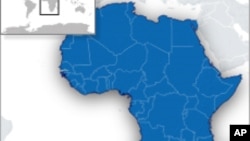As US Secretary of State Hillary Clinton ended her extensive trip to nine African nations, she announced the extension of favorable trade ties with Africa.
Congress has voted to extend the African Growth and Opportunity Act’s third country fabric provision until 2015. The act, known as AGOA, exempts a list of around 6,400 goods from being taxed when brought to the US market.
“It signals the US commitment to deepening its commercial engagement in Africa,” said Witney Schneidman, a scholar at the Washington-based Brookings Institution, a think-tank.
By extending the act’s third country fabric provision, the US allows African clothing manufacturers, who use material from outside the continent, to take advantage of AGOA’s tariff-free status.
“These are the products that have created about 300,000 new jobs in Africa that are clearly stimulating the economic development on the continent,” said Schneidman. He added this provision’s extension into 2015 provides a “good period of certainty for an apparel producer to set up factories in Africa…we’ve already seen that happening.”
Schneidman said countries that have benefitted from the provision include Lesotho, Kenya, Swaziland and Mauritius, where clothing factories have been built recently.
Despite the textile emphasis, energy imports, specifically oil, account for most of the financial value of products that have come into the US because of AGOA.
“The real challenge for AGOA is to diversify the volume of products coming into the US,” said Shneidman. “Of those 6400 products, only about 300 tariff lines are being used, and really only about 10 countries are taking advantage of the non- energy aspects of AGOA.”
The act was first signed into law in May 2000 and, according to Schneidman, in recent years, new products such as shea butter have begun to emerge.
Congress has voted to extend the African Growth and Opportunity Act’s third country fabric provision until 2015. The act, known as AGOA, exempts a list of around 6,400 goods from being taxed when brought to the US market.
“It signals the US commitment to deepening its commercial engagement in Africa,” said Witney Schneidman, a scholar at the Washington-based Brookings Institution, a think-tank.
By extending the act’s third country fabric provision, the US allows African clothing manufacturers, who use material from outside the continent, to take advantage of AGOA’s tariff-free status.
“These are the products that have created about 300,000 new jobs in Africa that are clearly stimulating the economic development on the continent,” said Schneidman. He added this provision’s extension into 2015 provides a “good period of certainty for an apparel producer to set up factories in Africa…we’ve already seen that happening.”
Schneidman said countries that have benefitted from the provision include Lesotho, Kenya, Swaziland and Mauritius, where clothing factories have been built recently.
Despite the textile emphasis, energy imports, specifically oil, account for most of the financial value of products that have come into the US because of AGOA.
“The real challenge for AGOA is to diversify the volume of products coming into the US,” said Shneidman. “Of those 6400 products, only about 300 tariff lines are being used, and really only about 10 countries are taking advantage of the non- energy aspects of AGOA.”
The act was first signed into law in May 2000 and, according to Schneidman, in recent years, new products such as shea butter have begun to emerge.




